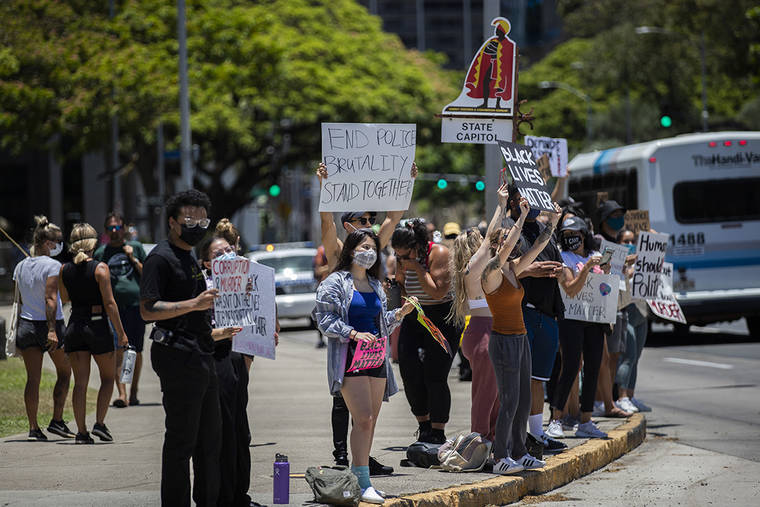Protests in Hawaii over the killing of George Floyd continue


CINDY ELLEN RUSSELL / CRUSSELL@STARADVERTISER.COM
About 120 demonstrators gathered at the state Capitol this afternoon in support of the Black Lives Matter movement, a years-long effort calling for equality for black Americans.


Hundreds in Honolulu protested again Wednesday in response to the killing of George Floyd in Minneapolis.
Over 200 demonstrators gathered at the state Capitol Wednesday afternoon to support the Black Lives Matter movement, a years-long effort calling for an end to police brutality against African Americans.
Most recently, demonstrators in Hawaii and thousands across the country have been protesting the circumstances surrounding Floyd’s death.
Floyd, 46, died May 25 while in custody of Minneapolis police officers. Video shot of Floyd face down on the street while former police officer Derek Chauvin had a knee on his neck captured Floyd’s pleas for help and his last words: “I can’t breathe.”
Chauvin has been charged second-degree murder, and three other police officers have been arrested in the murder case.
The killing of Floyd sparked national outrage, over a week of protests in cities across the world and many incidents of violence from both protesters and law enforcement officers. In Hawaii the demonstrations have been entirely peaceful.
Don't miss out on what's happening!
Stay in touch with breaking news, as it happens, conveniently in your email inbox. It's FREE!
PHOTOS: Hawaii joins global protests against racism and police brutality Opens in a new tab
The message of today’s gathering echoed those taking place around the U.S.: Stop police brutality against the black community.
Participants lined both sides of South Beretania Street holding signs that read “Black lives matter,” “Say their names” and “I can’t breathe” while waving to vehicles passing by. A protest was held at the Capitol Friday, and a vigil for Floyd, Breonna Taylor and Ahmaud Arbery — two black Americans shot and killed by a police officer or former police officer this year — was held Sunday.
Though Hawaii sits about 4,000 miles from Minneapolis, Minn., where Floyd was killed, and is heavily influenced by its Hawaiian, Asian and Pacific Islander population, demonstrators believe a show of solidarity is still important.
Malia E. Malufau, 36, highlighted her own experiences of solidarity between Pacific Islanders and black Americans. Malufau, who is Samoan, Hawaiian and Niuean, said her Samoan father was raised in Los Angeles and was welcomed by the black community.
Malufau, who had a sign that read “Black lives matter” in Samoan, studied political science and ethic studies at the University of Hawaii at Manoa and said her classes were full of African American history.
“We can come together for our people, for Black Lives Matter, because … we’ve experienced injustice,” she said.
Charmaine Propios, 38, who was at the Capitol, said she has attended a number of demonstrations advocating for equality, mentioning that she has also attended LGBTQ rallies and that this was not her first time participating in a Black Lives Matter demonstration.
“Even though the cops in Hawaii aren’t taking innocent people’s lives, it doesn’t mean that we don’t recognize and understand that it is happening on the mainland,” she said.
Propios, who has lived in Hawaii in 2004, was with her mother Deborah Williams, 60.
Eduardo Ellis, 17, moved to Hawaii from Japan two years ago and said people in Hawaii, especially younger people, are taking responsibility for spreading awareness.
“Although we may not experience too many social injustices here in Hawaii, I think that we just happen to be the fortunate people because our state is so diverse. But for that reason we still have to do our part and spread awareness,” he said.
Black Americans can also face existential problems while living in Hawaii, but according to Akiemi Glenn, executive director for and founder of the Pōpolo Project, it’s more complicated than the fact that people of African descent make up just over 2% of Hawaii’s population.
“There are not that many Samoans here — there are almost as many Samoans as there are people of African descent here in Hawaii. But Samoa still has some context in the region,” Glenn said. “It’s not so much a numbers game as (it is), for many people, not having cultural touchstones that feel meaningful to us.”
Kylah, one of the organizers of Wednesday’s demonstration, noted that problem of identity.
Stressing that it is no fault of Hawaii, the 19-year-old, who preferred not to share her last name, said, “It’s difficult to find your blackness in such a cultural melting pot.”



